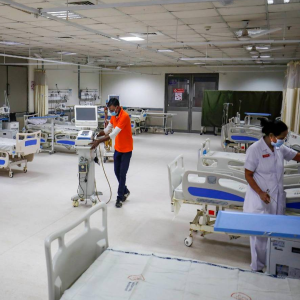India reports 2.64 lakh+ new cases of COVID-19 in just 24 hours. Omicron is continuously spreading like a wildfire across the world. Apart from this, the rise in the Covid-19 infected healthcare workers seems to cross all bounds. 1700+ doctors from nine states are infected by Covid-19.
Hospitals across the country are on high alert and gearing up to handle any further surge in Covid-19 cases amid growing concerns about the heavily mutated variant.
Union Health Secretary Mr. Rajesh Bhushan has urged states and UT’s to start the process of setting up makeshift and field hospitals and constitute specialized teams to monitor such hospitals.
In such a scenario, hospitals will have to be prepared more than before to tackle their operations and staff to ensure proper care to each and every patient.
Let us have a comprehensive look at how hospitals can achieve this, without compromising on the quality of healthcare.

How Can Hospitals Deal With Omicron?
There are certain ways to deal with the most severe disease worldwide. In the case of Omicron, it is vital to understand and collate all the learnings which we got from the 2020 and 2021 pandemic waves. We have brought together the top 4 points in this regard.
1. Sufficient Hospital Beds
In 2021, with the Delta variant, India saw a huge shortage of hospital beds and ventilators. As per the Human development report 2020, India had only five beds per 10,000 people which made the situation out of control in 2020-21.
Hence, the hospitals have to make sure that sufficient beds are available for the admission of covid patients.
Hospitals should acquire enough beds and leave at least 30% of the beds to handle the influx of covid patients.
Indraprastha Apollo Hospital has kept wards on standby to handle the rising infections.
2. Trained Workforce
India has 1.7 nurses per 1000 population, far less than the suggested rate of 3 nurses per 1000 population. However, if the healthcare workforce or nurses are trained to cope with such serious conditions, it would make it easy for hospitals to manage and cope with Omicron.
Nurses and other healthcare professionals should be trained so well that they can treat and manage covid patients without supervision.
3. Hire Locum Workers
Offering locum jobs to healthcare professionals can temporarily fulfill the duties of hospitals and medical institutions, which help to cope with Omicron.
Locum tenens help add diverse expertise and create efficiency in the workplace. Rising cases of omicron can lead to stress and burnout of the medical workers, which may result in poor performance.
Locum tenens can help to overcome burnout without compromising timely patient care.
4. Artificial Intelligence
Deployment of Artificial Intelligence in the healthcare system can take away the burnout load from the healthcare workers and streamline better patient care.
For example, AI can be used to analyze clinical notes on patients, and offer new insights, resulting in better care for the patient.
Moreover, AI and Telemedicine may be the solution to reduce paperwork and free up time to focus on patient care.
IFANGlobal – Your Helping Hand
With the vision to improve patient care in medical institutions and help cope with Omicron, IFANGlobal, one of the top healthcare recruitment companies, is increasingly deploying a workforce in all the hospitals across the world to fasten patient care.
We at IFANglobal have a wide pool of trained nurses which can be leveraged by the hospitals for their permanent and temporary staffing solutions.
Besides this, we also facilitate training for healthcare workers to make them industry-ready and help during such emergency situations.
If you are a medical institution that is struggling to handle the current surge of patients, contact us.
To know more visit: www.ifanglobal.com
